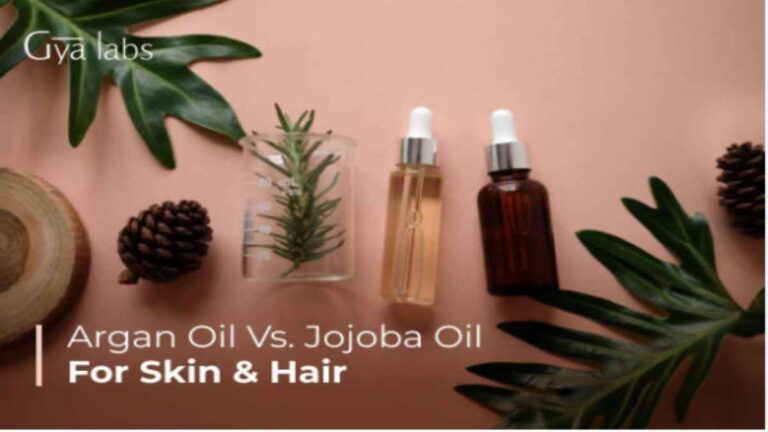Introduction
When it comes to natural beauty oils, two of the most popular choices are jojoba oil and argan oil. Both oils offer excellent benefits for skincare and haircare, but which one is best for you? Understanding the differences between jojoba oil vs argan oil will help you choose the right one based on your specific needs. This guide will compare their properties, benefits, and uses to help you make an informed decision.
What is Jojoba Oil?
Jojoba oil is a liquid wax extracted from the seeds of the jojoba plant. It closely resembles human sebum, making it a great moisturizer for the skin and scalp. This lightweight oil absorbs quickly without leaving a greasy residue.
Benefits of Jojoba Oil
- Hydrates Skin – Mimics natural skin oils, preventing dryness.
- Balances Oil Production – Helps regulate sebum, reducing acne and breakouts.
- Soothes Sensitive Skin – Contains anti-inflammatory properties that calm irritation.
- Strengthens Hair – Reduces dandruff and strengthens hair follicles.
- Long Shelf Life – Resistant to oxidation, making it last longer than other oils.
What is Argan Oil?
Argan oil, often referred to as “liquid gold,” comes from the kernels of the argan tree, native to Morocco. It is rich in essential fatty acids and vitamin E, making it a powerful oil for hydration and repair.
Benefits of Argan Oil
- Deep Moisturization – Intensely hydrates skin and hair.
- Anti-Aging Properties – Packed with antioxidants that fight wrinkles.
- Tames Frizz – Smooths hair and adds shine.
- Protects Against Damage – Shields hair and skin from environmental stressors.
- Helps Heal Skin Conditions – Soothes eczema, psoriasis, and scars.
Jojoba Oil vs Argan Oil: Key Differences
1. Texture and Absorption
- Jojoba oil is lightweight and absorbs quickly.
- Argan oil is slightly heavier and takes longer to absorb.
2. Best for Skin Type
- Jojoba oil is ideal for oily and acne-prone skin.
- Argan oil is better suited for dry and mature skin.
3. Best for Hair Type
- Jojoba oil is great for scalp health and reducing dandruff.
- Argan oil is excellent for frizzy, dry, and damaged hair.
4. Nutrient Profile
- Jojoba oil is rich in vitamin E, B-complex, and minerals.
- Argan oil contains high levels of vitamin E, fatty acids, and antioxidants.
5. Shelf Life
- Jojoba oil has a longer shelf life due to its stability.
- Argan oil is more prone to oxidation and should be stored properly.
How to Use Jojoba Oil and Argan Oil
For Skin:
- Jojoba Oil: Apply a few drops directly to the face or mix with moisturizer.
- Argan Oil: Use as a night serum or add to body lotion for extra hydration.
For Hair:
- Jojoba Oil: Massage into the scalp to reduce dandruff and promote hair growth.
- Argan Oil: Apply to damp hair for frizz control and deep nourishment.
Which One Should You Choose?
- For oily and acne-prone skin: Jojoba oil is the better choice.
- For dry and aging skin: Argan oil provides intense hydration.
- For scalp health and dandruff: Jojoba oil works best.
- For frizz control and hair repair: Argan oil is superior.
Conclusion
Both jojoba oil and argan oil offer incredible benefits, but their effectiveness depends on your specific needs. If you have oily skin or scalp concerns, jojoba oil is a great option. If your goal is deep hydration and frizz control, argan oil is the better choice. Either way, incorporating these natural oils into your beauty routine will enhance your skin and hair health.
FAQs
1. Can I use jojoba oil and argan oil together?
Yes! You can mix both oils to enjoy their combined benefits for skin and hair.
2. Which oil is better for acne-prone skin?
Jojoba oil is best for acne-prone skin as it regulates sebum and prevents breakouts.
3. Is argan oil good for oily hair?
Argan oil is rich and may be too heavy for oily hair, but it works well for dry and frizzy hair.
4. Can I use jojoba oil or argan oil daily?
Yes, both oils are gentle enough for daily use.
5. Which oil is better for anti-aging?
Argan oil is better for anti-aging due to its high antioxidant content.
6. Does jojoba oil clog pores?
No, jojoba oil is non-comedogenic and safe for all skin types.
7. How do I store jojoba and argan oil?
Keep them in a cool, dark place to maintain their potency.
8. Is argan oil safe for sensitive skin?
Yes, but always do a patch test first to ensure no allergic reaction.
